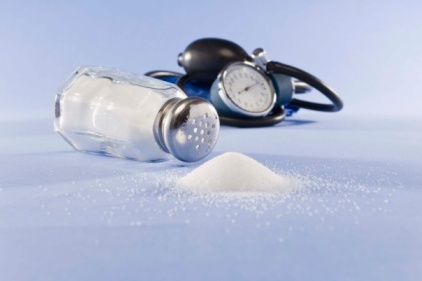Don't pass the salt shaker, please

 For the estimated one in three Americans who will develop high blood pressure, a - diet high in sodium may be to blame. That's why the American Heart Association (AHA) and American Stoke Association is using World Salt Awareness Week -- this week to reminder Americans about the dangers of excessive sodium.
For the estimated one in three Americans who will develop high blood pressure, a - diet high in sodium may be to blame. That's why the American Heart Association (AHA) and American Stoke Association is using World Salt Awareness Week -- this week to reminder Americans about the dangers of excessive sodium.
The AMA says about 90 percent of Americans eat more salt/sodium than is recommended for a healthy diet. Moreover, 65 percent of consumers are concerned about their sodium intake, yet only 29 percent of consumers offer that they regularly check the sodium content of food.
World Salt Awareness Week was started by the World Action on Salt and Health (WASH) and the dedicated week receives widespread support from numerous countries around the world to highlight the importance of reducing sodium intake in all populations throughout the world. The American Heart Association/American Stroke Association is committed to helping consumers lower their sodium intake as a means to prevent heart disease and stroke, as well as improve their overall health.
Raising consumer awareness and encouraging them to reduce the amount of sodium they consume is one part of the equation. Unfortunately, more than 75 percent of consumed sodium comes from processed foods. The American Heart Association/American Stroke Association is also actively encouraging manufacturers, food processors and restaurants to reduce the amount of sodium in the food supply and advocating for healthier foods to be readily available and accessible to consumers.
It is estimated that if Americans cut their average sodium intake by more than half – to an average of 1,500 mg a day- there would be a nearly 26 percent decrease in high blood pressure and a savings of more than $26 billion in healthcare costs in just over a year. Sodium is an acquired taste; to help consumers guide themselves to living a heart-healthy lifestyle, the American Heart Association/American Stroke Association recommends foods with little or no salt.
“Reducing sodium intake in your diet is one of the most important things you can do to help you live a longer, healthier life,” Gordon Tomaselli, M.D. and President of the American Heart Association commented.
The AHA offers the following tips"
•Read nutrition labels to find foods that are lower in sodium
•Choose fresh fruits and vegetables when possible
•Limit the amount of processed foods and limit portion size
•Avoid adding salt when cooking; use fresh herbs instead
•When dining out, ask for your dish to be prepared without salt
•Try to choose foods with potassium. They counter the effects of sodium and may help lower your blood pressure
For more information visit www.heart.org/sodium.
Looking for a reprint of this article?
From high-res PDFs to custom plaques, order your copy today!





